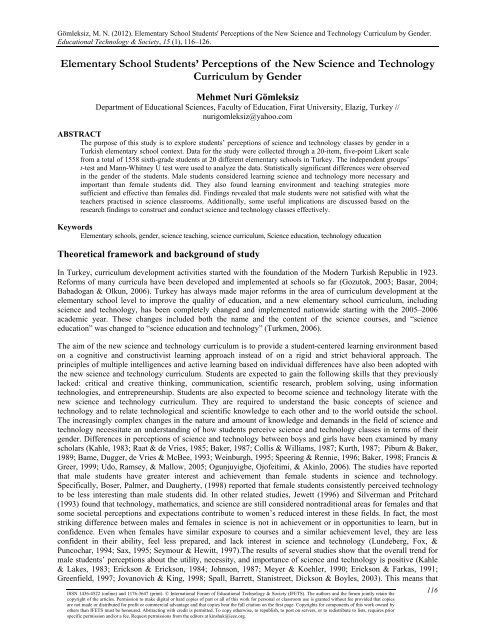January 2012 Volume 15 Number 1 - Educational Technology ...
January 2012 Volume 15 Number 1 - Educational Technology ...
January 2012 Volume 15 Number 1 - Educational Technology ...
You also want an ePaper? Increase the reach of your titles
YUMPU automatically turns print PDFs into web optimized ePapers that Google loves.
Gömleksiz, M. N. (<strong>2012</strong>). Elementary School Students' Perceptions of the New Science and <strong>Technology</strong> Curriculum by Gender.<br />
<strong>Educational</strong> <strong>Technology</strong> & Society, <strong>15</strong> (1), 116–126.<br />
Elementary School Students’ Perceptions of the New Science and <strong>Technology</strong><br />
Curriculum by Gender<br />
Mehmet Nuri Gömleksiz<br />
Department of <strong>Educational</strong> Sciences, Faculty of Education, Firat University, Elazig, Turkey //<br />
nurigomleksiz@yahoo.com<br />
ABSTRACT<br />
The purpose of this study is to explore students’ perceptions of science and technology classes by gender in a<br />
Turkish elementary school context. Data for the study were collected through a 20-item, five-point Likert scale<br />
from a total of <strong>15</strong>58 sixth-grade students at 20 different elementary schools in Turkey. The independent groups’<br />
t-test and Mann-Whitney U test were used to analyze the data. Statistically significant differences were observed<br />
in the gender of the students. Male students considered learning science and technology more necessary and<br />
important than female students did. They also found learning environment and teaching strategies more<br />
sufficient and effective than females did. Findings revealed that male students were not satisfied with what the<br />
teachers practised in science classrooms. Additionally, some useful implications are discussed based on the<br />
research findings to construct and conduct science and technology classes effectively.<br />
Keywords<br />
Elementary schools, gender, science teaching, science curriculum, Science education, technology education<br />
Theoretical framework and background of study<br />
In Turkey, curriculum development activities started with the foundation of the Modern Turkish Republic in 1923.<br />
Reforms of many curricula have been developed and implemented at schools so far (Gozutok, 2003; Basar, 2004;<br />
Babadogan & Olkun, 2006). Turkey has always made major reforms in the area of curriculum development at the<br />
elementary school level to improve the quality of education, and a new elementary school curriculum, including<br />
science and technology, has been completely changed and implemented nationwide starting with the 2005–2006<br />
academic year. These changes included both the name and the content of the science courses, and “science<br />
education” was changed to “science education and technology” (Turkmen, 2006).<br />
The aim of the new science and technology curriculum is to provide a student-centered learning environment based<br />
on a cognitive and constructivist learning approach instead of on a rigid and strict behavioral approach. The<br />
principles of multiple intelligences and active learning based on individual differences have also been adopted with<br />
the new science and technology curriculum. Students are expected to gain the following skills that they previously<br />
lacked: critical and creative thinking, communication, scientific research, problem solving, using information<br />
technologies, and entrepreneurship. Students are also expected to become science and technology literate with the<br />
new science and technology curriculum. They are required to understand the basic concepts of science and<br />
technology and to relate technological and scientific knowledge to each other and to the world outside the school.<br />
The increasingly complex changes in the nature and amount of knowledge and demands in the field of science and<br />
technology necessitate an understanding of how students perceive science and technology classes in terms of their<br />
gender. Differences in perceptions of science and technology between boys and girls have been examined by many<br />
scholars (Kahle, 1983; Raat & de Vries, 1985; Baker, 1987; Collis & Williams, 1987; Kurth, 1987; Piburn & Baker,<br />
1989; Bame, Dugger, de Vries & McBee, 1993; Weinburgh, 1995; Speering & Rennie, 1996; Baker, 1998; Francis &<br />
Greer, 1999; Udo, Ramsey, & Mallow, 2005; Ogunjuyigbe, Ojofeitimi, & Akinlo, 2006). The studies have reported<br />
that male students have greater interest and achievement than female students in science and technology.<br />
Specifically, Boser, Palmer, and Daugherty, (1998) reported that female students consistently perceived technology<br />
to be less interesting than male students did. In other related studies, Jewett (1996) and Silverman and Pritchard<br />
(1993) found that technology, mathematics, and science are still considered nontraditional areas for females and that<br />
some societal perceptions and expectations contribute to women’s reduced interest in these fields. In fact, the most<br />
striking difference between males and females in science is not in achievement or in opportunities to learn, but in<br />
confidence. Even when females have similar exposure to courses and a similar achievement level, they are less<br />
confident in their ability, feel less prepared, and lack interest in science and technology (Lundeberg, Fox, &<br />
Puncochar, 1994; Sax, 1995; Seymour & Hewitt, 1997).The results of several studies show that the overall trend for<br />
male students’ perceptions about the utility, necessity, and importance of science and technology is positive (Kahle<br />
& Lakes, 1983; Erickson & Erickson, 1984; Johnson, 1987; Meyer & Koehler, 1990; Erickson & Farkas, 1991;<br />
Greenfield, 1997; Jovanovich & King, 1998; Spall, Barrett, Stanistreet, Dickson & Boyles, 2003). This means that<br />
ISSN 1436-4522 (online) and 1176-3647 (print). © International Forum of <strong>Educational</strong> <strong>Technology</strong> & Society (IFETS). The authors and the forum jointly retain the<br />
copyright of the articles. Permission to make digital or hard copies of part or all of this work for personal or classroom use is granted without fee provided that copies<br />
are not made or distributed for profit or commercial advantage and that copies bear the full citation on the first page. Copyrights for components of this work owned by<br />
others than IFETS must be honoured. Abstracting with credit is permitted. To copy otherwise, to republish, to post on servers, or to redistribute to lists, requires prior<br />
specific permission and/or a fee. Request permissions from the editors at kinshuk@ieee.org.<br />
116

















